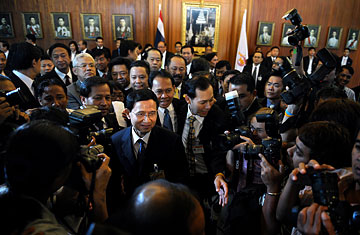
Thailand's newly elected Prime Minister Somchai Wongsawat, center, leaves the Parliament House in Bangkok on Sept. 17
It was just what the thousands of protesters camped out at Thailand's leadership compound have been demanding since they besieged Government House three weeks ago. On September 17, Thailand's parliament elected Somchai Wongsawat as the country's new Prime Minister, replacing embattled political veteran Samak Sundaravej, who only served in the top post for just over six months.
But the crowds still camped outside Samak's former offices are not impressed. The demonstrators, who call themselves the People's Alliance for Democracy (PAD), had been calling for Samak's ouster ever since he took office, labeling him nothing more than a puppet of former Prime Minister Thaksin Shinawatra, who himself had been deposed by a bloodless military coup in 2006. A billionaire tycoon who now lives in self-imposed exile in Britain, Thaksin has been charged with corruption in several different cases. (On the same day Somchai was voted in, the Supreme Court issued a third arrest warrant against Thaksin for failing to show up in court.) But even though Samak is gone and his predecessor charged with criminal wrongdoing, the Thaksin connection remains. Somchai, a former judge who served in Samak's cabinet as Education Minister, also happens to be Thaksin's brother-in-law.
Indeed, Thailand's latest political crisis, which has driven away foreign tourists and caused the country's stock market to swoon, is looking ever more intractable. Samak was kicked out of power in an unlikely fashion. Last week, the Constitutional Court determined that he had contravened the national charter by accepting compensation for a second job while serving as Prime Minister. The job? Hosting a few episodes of a T.V. cooking show. The payment? $2,300. Although the court ordered Samak to step down, there was nothing stopping his People Power Party (PPP) from re-nominating him as Prime Minister. But a revolt among the five other members of the ruling coalition squelched any plans to resuscitate the career of one of Thailand's most fiery politicians.
Instead, the PPP settled on the 61-year-old Somchai, whose cautious demeanor bespeaks two decades spent in the judiciary. Somchai is a career bureaucrat and one of the PPP's most respected politicians. But his marriage to Thaksin's sister, who also served as a parliamentarian, makes him unacceptable to the PAD, which accuses Thaksin of having bought many of the rural voters who swept him into office with a record mandate. "[Somchai] is Thaksin's brother-in-law and will be even more his proxy than Samak ever was," Chamlong Srimuang, one of the PAD's leaders, told reporters, vowing to keep up the Government House siege until a Prime Minister who's not from the PPP is named.
Who the PAD actually wants to rule Thailand is less clear. In spite of the fact that the group uses the word "democracy" in its name, the PAD backs a political system in which an elected parliament could be replaced by one that is partly appointed. Some PAD leaders have advocated what they call a "People's Revolutionary Government," though there's little consensus among the PAD's disparate factions — which include labor activists, ethnic Chinese businessmen and staunch royalists — as to how such a government should come to power or what it might do on a day-to-day basis.
Somchai, who was named as caretaker Prime Minister when Samak was stripped of that position last week, quickly lifted the state of emergency the former P.M. had declared after clashes between the PAD and a pro-government group turned deadly late last month. The move was, in part, designed to calm the battered stock market and send a message to tourists that Thailand was stable again — a badly needed signal given that hotel occupancy is down roughly 40% from last year.
Unlike Samak, Somchai is not one to up the ante, and he has vowed to "bring unity" back to Thailand. The new P.M. also vowed not to interfere in the ongoing court cases against his brother-in-law. Nevertheless, the basic rift between the rural poor, who support Thaksin, and the urban middle class and elite, who despise him, is only growing wider. Furthermore, another case that will reach the constitutional court in the coming months might force the dissolution of Somchai's PPP because of a vote-buying conviction against its former deputy leader. If that happens, Somchai will be forced to resign. And Thailand will have to scramble again for a new P.M. to take on the daunting task of national reconciliation.
